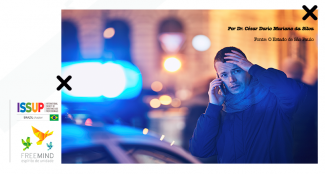Drugs put the entire community at risk

Discussions on the decriminalization of drug possession for personal consumption are increasing, including an extraordinary appeal still pending judgment in the Supreme Court on this subject (RExt. 635.659).
However, it is frightening to see a member of the Public Prosecutor's Office openly defending in an article published on a legal website, not the release of the drug for his own use, with which, by the way, I do not agree, but that the trade or even the free delivery of drugs, between adult and capable parties, does not generate injury or concrete danger of injury to the protected legal good, which is public health.
In fact, for that writer, both possession for use and drug trafficking should be released, since the rules that punish these conducts, for larger and capable parties, are unconstitutional because they violate the principles of legality and harm.
Quite a mistake.
If, it is true, that the use of drugs harms the health of the user, which no one doubts, it is also true that he is not the only one harmed. The community as a whole is put at risk of harm. Public health is very diffuse, but concretely perceptible. And it is up to the State to protect its citizens from the vices that can affect them. Drug addiction has the potential to destabilize the current system, as long as a reasonable number of people are affected by it.
There is no survey of the number of deaths from overdose or from diseases caused by the use of illicit drugs. There are also no reliable statistics on the number of crimes that are committed by people under its influence. And, also, it is not known how many crimes are committed because the victim is a drug user.
But one thing cannot be denied, the harm of drugs, whether directly or indirectly, is very great.
That is why this crime is considered to be of abstract danger, that is, the risk of damage does not need to be proven, being presumed absolutely.
Those who work in the criminal area, notably in the Jury, know that a good part of homicide crimes are committed by people who are under the influence of drugs, whether licit or illicit. Many crimes are committed against drug users for some reason related to their addiction (disagreements, petty crimes, debt with traffickers, etc.).
One of the reasons that inhibit the use of the drug is the fact that it is prohibited. By freeing its use and trade, as apparently the DD Prosecutor of Justice intends, which is what decriminalization will do, it will certainly encourage those who are afraid of the consequences, whether in the criminal or social areas. If it is allowed, why can't I make social use of marijuana, cocaine, crack and other drugs? This question will cross the minds of countless people, especially the younger ones.
And worse, the member of the parquet argues that "... the criminalization of the sale of drugs, between adults and in the enjoyment of their mental faculties, is unconstitutional, as it violates criminal principles such as legality and harmfulness, in addition to being incapable of protecting "public health", since there is no demonstration that the conduct can harm it or put it in concrete danger", which leads me to believe that, If he works in the criminal area, he may file a police investigation that investigates drug trafficking or ask for the acquittal of the trafficker.
One of the most important functions of the Member of the Public Prosecutor's Office is the protection of society against the scourge of crime, which has as one of its maximum exponents drug trafficking, which moves organized crime and destroys lives, either through the use and dependence of drugs, or indirectly, since other crimes derive from it as or more serious, such as homicide, bodily injury, corruption, money laundering and even terrorism.
The DD Prosecutor also forgets that there is an insurmountable obstacle to the declaration of the unconstitutionality of the criminal type of drug trafficking in all its forms. This is because there is a criminalization warrant expressed in article 5, item XLIII, of the FC, determining that the law considers it as a crime of special gravity, equivalent to heinous, giving its author, co-author or participant severe penal and criminal procedural consequences. Not even by constitutional amendment can this provision be changed or revoked, as it is a stony clause, the intangible core of the Federal Constitution (art. 60, § 4, IV, of the FC).
Therefore, drug trafficking must be curbed and punished severely, enforcing the preventive (general and special) and repressive purposes of the penalty.
*César Dario Mariano da Silva, Attorney General – SP. Master in Social Relations Law. Specialist in Criminal Law. University Professor. Author of several books, including Manual de Direito Penal, Lei de Execução Penal Comentada, Prova Ilícitas, Estatuto do Desarmament and Lei de Drogas Comentada, published by Juruá Editora